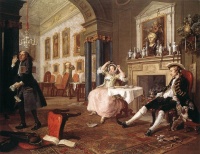Institution
From The Art and Popular Culture Encyclopedia
| Revision as of 13:46, 14 September 2011 Jahsonic (Talk | contribs) ← Previous diff |
Current revision Jahsonic (Talk | contribs) |
||
| Line 1: | Line 1: | ||
| + | [[Image:Hogarth Marriage.jpg|thumb|200px|''[[Tête-à-Tête]]'' (1743) by William Hogarth]] | ||
| {{Template}} | {{Template}} | ||
| - | :''[[Movement and Institution]], [[Institutional theory of art]]'' | ||
| - | # An [[establish]]ed [[organisation]], especially one [[dedicate]]d to [[education]], [[public]] [[service]], [[culture]] or the [[care]] of the [[destitute]], [[poor]] etc. | + | An '''institution''' is any [[social structure|structure]] or [[social mechanism|mechanism]] of [[social order]] and [[cooperation]] governing the [[behavior]] of a set<!--non-technical, no need to link--> of [[individual]]s within a given human community. Institutions are identified with a [[social purpose]] and permanence, transcending individual [[human]] lives and intention by enforcing rules that govern cooperative human behavior. |
| - | # The [[building]] which [[house]]s such an organisation. | + | |
| - | # A [[custom]] or [[practice]] of a [[society]] or [[community]] - [[marriage]] for example. | + | The term "institution" is commonly applied to customs and behavior patterns important to a [[society]], as well as to particular formal organizations of [[government]] and public services. As structures and mechanisms of social order among humans, institutions are one of the principal objects of study in the [[social sciences]], such as [[political science]], [[anthropology]], [[economics]], and [[sociology]] (the latter being described by [[Durkheim]] as the "science of institutions, their genesis and their functioning"). Institutions are also a central concern for [[law]], the formal mechanism for political rule-making and enforcement. |
| - | # (Informal) - A [[person]] long established with a [[certain]] [[place]] or [[position]]. | + | |
| - | # The act of instituting. | + | ==See also== |
| + | |||
| + | :''[[Movement and Institution]], [[Institutional theory of art]], [[institutionalization]]'' | ||
| + | * [[Deinstitutionalization]] | ||
| + | * [[State (polity)|state]], [[Nation]], [[country]], [[Sovereign state]] | ||
| + | * for effect on individuals: [[institutionalization]] | ||
| + | * [[Institute]] | ||
| + | * [[Institutional abuse]] | ||
| + | * [[Institutional economics]] | ||
| + | * [[Institutional logic]] | ||
| + | * [[Institutional memory]] | ||
| + | |||
| {{GFDL}} | {{GFDL}} | ||
Current revision

|
Related e |
|
Featured: |
An institution is any structure or mechanism of social order and cooperation governing the behavior of a set of individuals within a given human community. Institutions are identified with a social purpose and permanence, transcending individual human lives and intention by enforcing rules that govern cooperative human behavior.
The term "institution" is commonly applied to customs and behavior patterns important to a society, as well as to particular formal organizations of government and public services. As structures and mechanisms of social order among humans, institutions are one of the principal objects of study in the social sciences, such as political science, anthropology, economics, and sociology (the latter being described by Durkheim as the "science of institutions, their genesis and their functioning"). Institutions are also a central concern for law, the formal mechanism for political rule-making and enforcement.
See also
- Deinstitutionalization
- state, Nation, country, Sovereign state
- for effect on individuals: institutionalization
- Institute
- Institutional abuse
- Institutional economics
- Institutional logic
- Institutional memory

